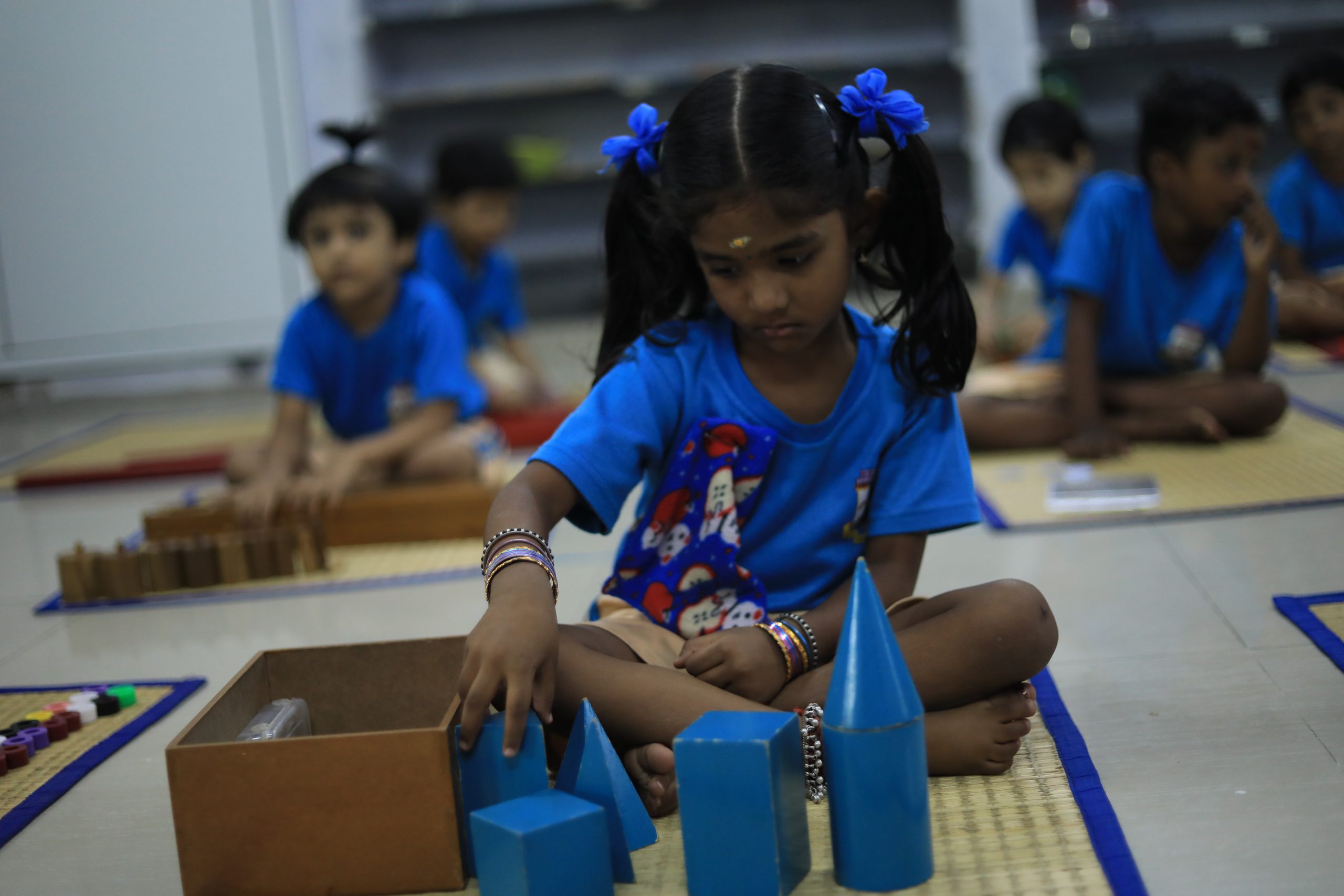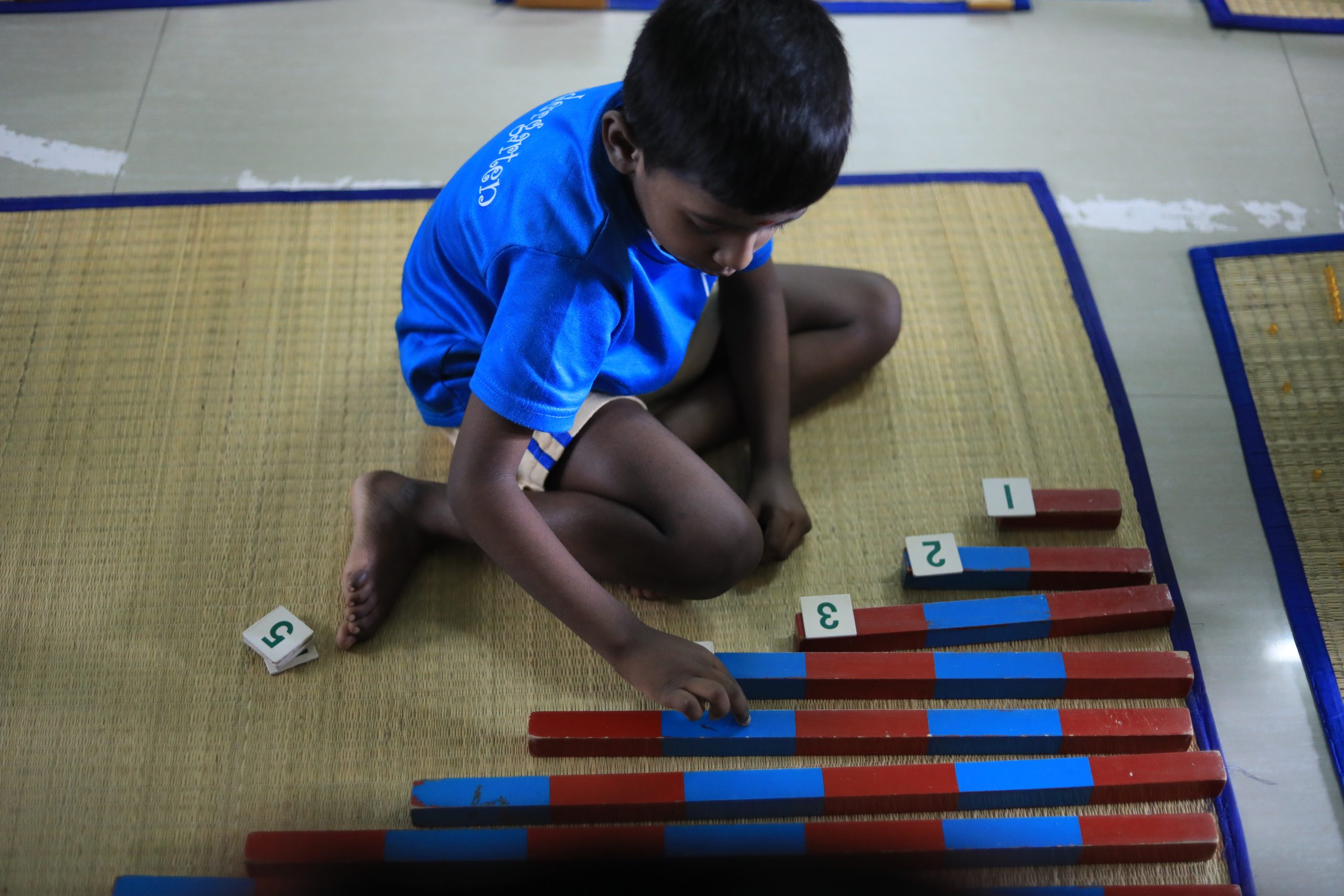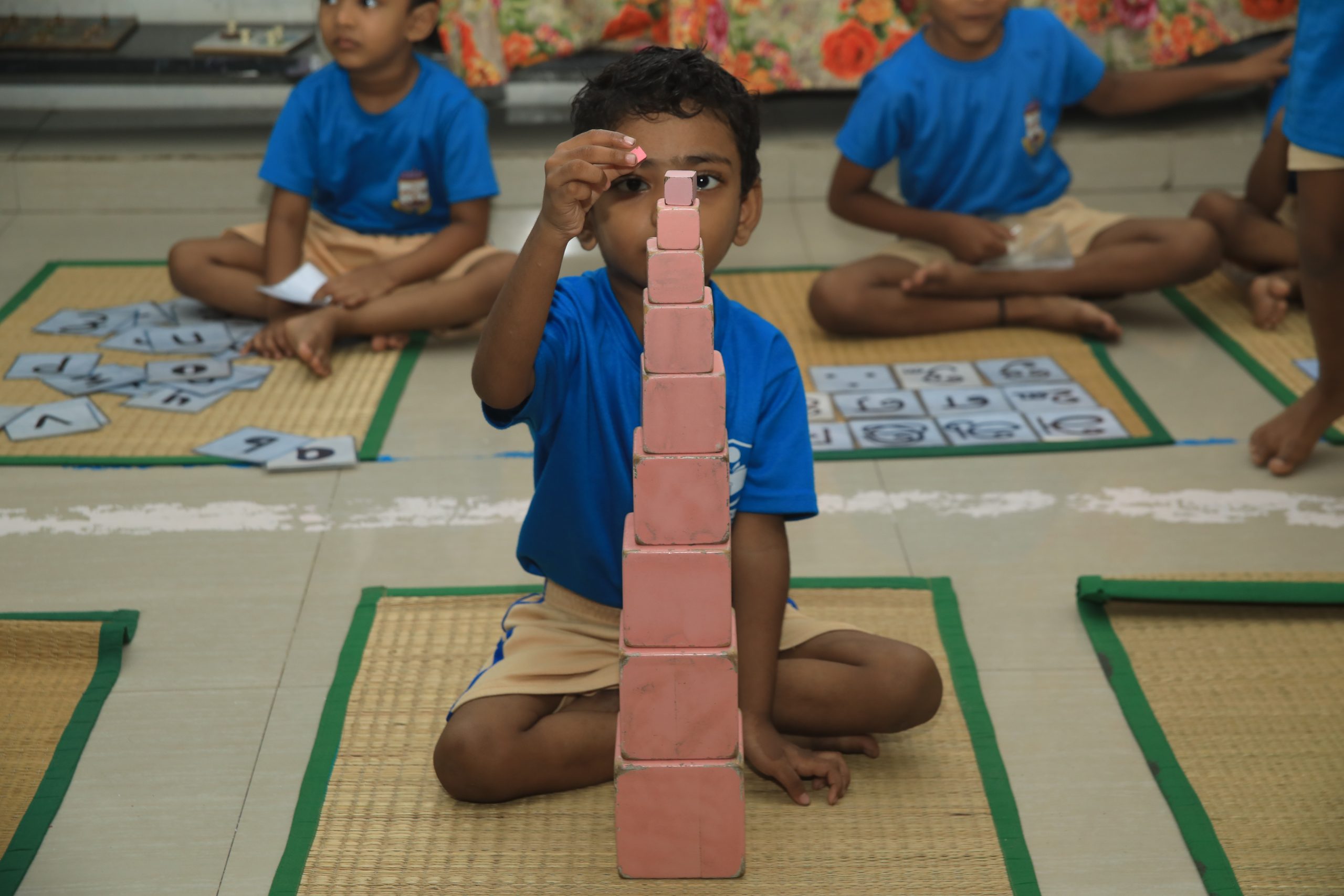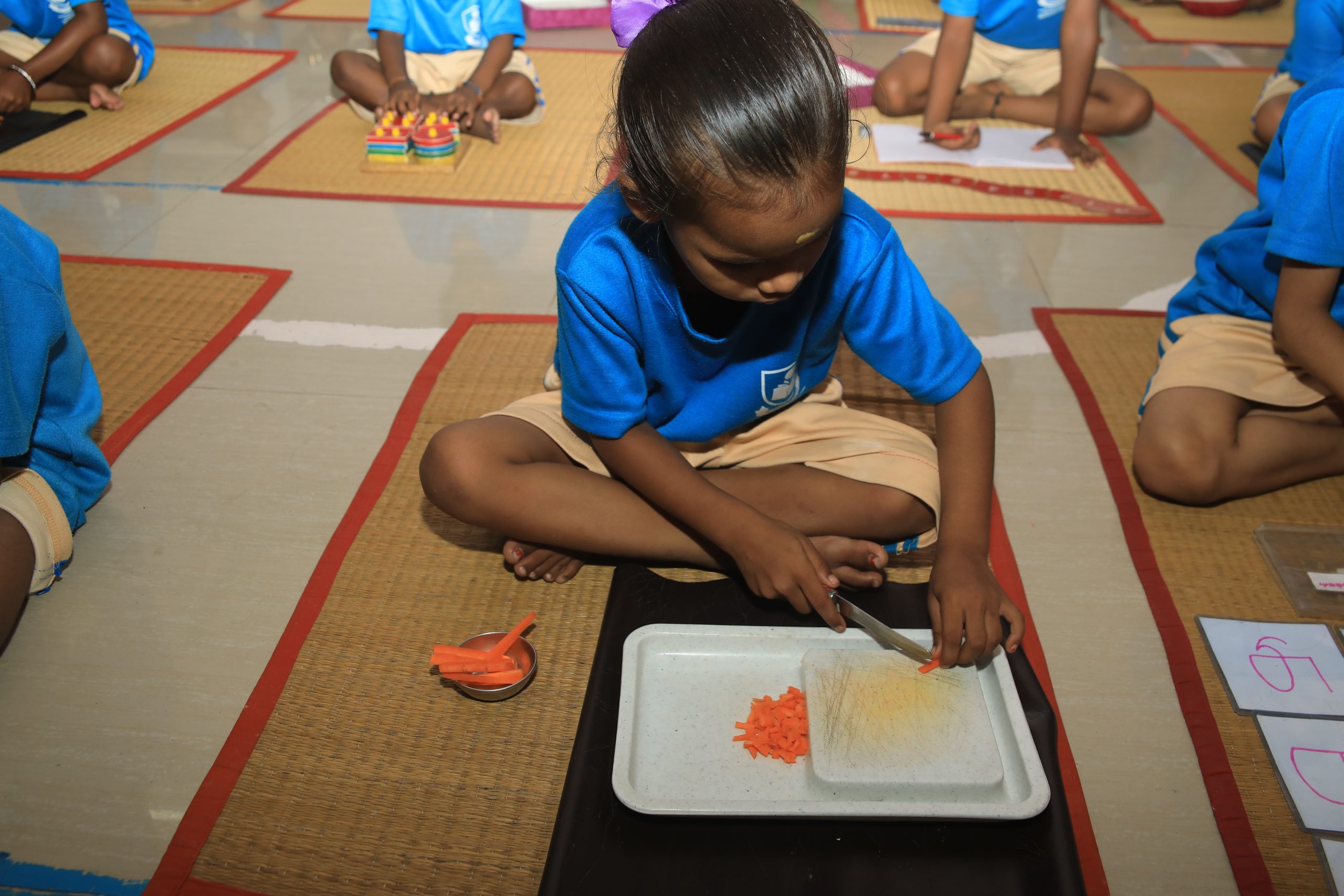Why Montessori system of education?
Montessori is based on child’s education being guided by inner needs and interests.
Two important development needs of children are:
- The need of freedom within limits
- Prepared environment which exposes the children to scientifically tested materials and experiences
What does freedom with limits mean?
- It means setting clear expectations and ground rules ahead of time, and following through.
- It means making and sticking to (flexible) routines.
- It means a secure, loving and trusting relationship between the child and the adult.
- It also means age-appropriate choices and opportunities for self-mastery and independence
Prepared Environment
- Providing an environment with engaging materials, a three-hour work cycle, minimal distractions.
- The Montessori adult creates an opportunity for concentration that will lead to self-discipline.
- When the child freely chooses work, the choice emerges from inner directive.
- By means of these exercises, children not only exercise their muscles but they also give order to, and enrich their minds.
- These activities strengthen the will and develop understanding.
Salient Features of the Montessori Environment:
- Prepared environment, mixed age group, physical independence, movement and freedom, responsibility and discipline are the most common positive affirmations of the environment.
- Offering freedom with limits provides a comfortable balance between an overly structured and a chaotic environment.
- Similarly, responsibility is not something that our teachers, parents and society wants us to do, nor something that is our duty.
- It should not be binding. Being responsible is not doing something because somebody told us to do so.
- Being responsible is something that comes from within. It presupposes thoughtfulness and mindfulness.
- The Montessori materials do just that, they train the mind to be conscious, sensitive and alert.
- The practical learning and application of concepts in a Montessori environment in early childhood education prepares a child to face the world, irrespective of their social status.




OVERVIEW OF THE CURRICULUM FOR THE CHILDREN BETWEEN 2YRS TO 6YRS:
Language:
Good handwriting plays an important role in an individual’s life; having a legible and good handwriting makes it easy for the child to communicate and also boosts morale and self confidence in a child.
Arithmetic:
In conventional schools, they start by giving the symbols, they then give the names and quantities in separate units. In Montessori environment, at this early stage, only quantities and the names of the quantities are given and later the symbols.
Sensorial:
The beauty of the sensorial materials is that they teach the abstract concepts like color, shape by isolating the “physical properties of the matter” and not given away by name. Every object around the child has color, shape, size, smell or taste, and we offer each concept through one material. Later, the child is able to put together and say, “big chair”, “blue and heavy”, etc.
Exercise of practical life:
These activities help the child to refine the movements and strengthen the hands. These are familiar and favorite activities for the child as they are done at home. The focus is for the child to look forward to come to a Montessori environment as hands are the instruments for intelligence.
About Montessori:
Born in Italy in 1870, Dr. Maria Montessori, was a remarkable educator whose insights remain profound. She believed each child is a secret which is gradually revealed as he/she develops. Maria Montessori, was adamant that intelligence blossoms when imagination is sparkled.
Montessori began to develop her philosophy and method in 1897, attending courses in pedagogy at the university of Rome and reading the educational theory of the previous two hundred years. In 1907, she opened her first classroom, the casa de Bambini, or children’s House, in a tenement building in Rome. From the beginning, Montessori based her work on her observations of children and experimentation with the environment, materials, lessons available to them. She frequently referred her work as “scientific pedagogy”.
Dr. Maria Montessori, believed that the goal of early education should be to cultivate children’s natural desire to learn instead of filling them with facts from a pre- selected course of studies.
On the invitation of the president of the Theosophical society, Dr. Maria Montessori, arrived in Adyar in 1939 along with her son Mr. Mario Montessori, Sr. The first international Montessori course started here with students from all over India. This was the beginning of Montessori in India.
LONG TERM POSITIVE IMPACT OF THE MONTESSORI SYSTEM OF EDUCATION
Good Handwriting (Based on teachers’ observation)
In the Montessori classroom the children are systematically and carefully prepared for writing. The child may start writing words only when he/she is 4 years old. But, even before that the hand is prepared for writing, muscle control is developed by doing practical life tasks with controlled movements. For example, when pouring water into a cup the child is asked to pay attention to a line marked on the cup, and be careful to stop exactly when the marked line is reached. This calls for visual attention and muscle control.
Interest in Learning: (Teachers’ observation – “when one lesson is completed, they want to go on to the next”)
In the Montessori environment, it is a common sight to see toddlers crying when they have to leave the classroom and go home!
Children feel at home and work in a very relaxed manner. They are busy, but unhurried. They are focused in their work, but, underlying the intense concentration there is calm self-assurance, not the pressure of completing a disliked task.
This is possible because children have the freedom to work with developmentally rich pedagogical materials that are immensely satisfying. There is a goal to be achieved, a challenge to be overcome. Children like to be challenged. The child feels a natural urge to repeat until he/she gets it right. There is no pressure, only pleasure.
Freedom Begets Discipline:
The general notion is that children won’t like to remain in one place and be orderly and organized. Montessori System proves otherwise.
The discipline is arrived at most naturally, without any external force. Ironically, it is freedom that begets discipline. In a Montessori classroom, the child can choose any material that he/she feels the urge to work with. Only he/she needs to follow the ground rules of handling and putting things back in the manner that he/she found them, ready and complete for the next child to work with it.
Caring and Sharing
Children in this system of education prove very helpful, compassionate and understanding towards each other.
There are practical life activities like cutting vegetables and sifting, pounding and pouring. There are older children and younger children all working in one room. Older children are frequently asked to help the younger ones just like we do at home. This fosters an environment of co-operation and filial feeling. The older ones take pride in helping the younger ones.
Children have the sharing and caring attitude in all their activities. They are not possessive about the accessories and they are willing to share what they have, be it an object or knowledge that they have acquired, with their fellow students.
Children never rush or push to be in the forefront for anything. They wait for their turn in a queue patiently and willingly. In fact, standing in a queue for their turn is never an irksome task for them. It is a way of life for them. In other words, they respect others’ time and rights as much as their own.
Montessori children do not feel intimidated by adults.
Children who study in Montessori System of Education are not intimidated by adults. They look straight into the adult’s eyes and respond, at the same time with due respect and courtesy.
Every child has the inner drive to acquire physical independence. He/she aspires to overcome difficulties and become better. He/she follows a path of successive stages of independence and mastery of the various aspects of life. In this journey, the teacher helps his/her to act and think for himself/herself. He/She never exerts his/her authority, never infuses his/her ideas and thoughts and never hastens to help or correct him/her. The child is revered and respected. He/she is not assessed, or punished. So, there is no question of fear only deep respect for his/her teacher.
Resilience.
Children learn to face ridicules and sarcastic comments aimed against them without getting heartbroken. Children do not suffer from inferiority complex.
Contrary to orthodox methods of teaching that treats the child to be with a void mind waiting to be filled with our knowledge, the Montessori Method conversely believes that the child has a hidden power to spontaneously absorb and construct knowledge. The scientifically developed pedagogical materials help the child to work independently. The child learns guided by his own labour, builds ideas and concepts brick by brick by systematically taking up, repeating and perfecting one task after another. This process of self-construction gives him a quiet dignity, a feeling of self-worth. There is an inner joy, satisfaction and pride. Self-achievement fosters self-respect.
Children are independent.
They do their chores independently, without others asking them or directing them to do. And, when they do a work they complete it with single-minded concentration and only then they turn their attention to other things.
The materials in a Montessori classroom do not look colourful or attractive. But, they are designed to feed the interest of the child.
Children studying in Montessori System of Education take pride in keeping their place clean and if they see the place unclean they don’t wait for someone to do the cleaning but be the first one to do it!
Practical life activities like washing, wiping, dusting, sweeping are all a part of the curriculum in a Montessori classroom. The child is free to choose any activity he/she wants. This freedom comes with a responsibility attached to it. The child learns early in life the responsibility of keeping his environment clean and orderly.
Empathetic
Montessori children never laugh at other’s predicaments or disabilities. On the other hand, they come forward to help them and be of assistance to them.
The child in a Montessori classroom may be aware that each of his/her friends are differently endowed. The older or better children assist whenever help is required, and to the extent required. Time and again we have observed that whenever a child accidentally spills anything, everyone rushes to help. Yet, we have also always observed that no child interferes in the work of another even if the other child may be struggling. They respect the effort of the other child, but hasten to aid the child if he/she looks for help. The teacher also watches and waits, and never rushes to correct or help.
It is also important to note that no child is lauded or criticized. There is no race to finish first, or rivalry in being ranked. The children are not working on similar planes to be compared. In the absence of competition there is familial feeling, a natural feeling of camaraderie.
Not Gender Biased:
Montessori children are not gender-biased. Both boys and girls do the chores willingly. Be it cleaning the vessels, cutting vegetables, sweeping the floor, they have no reservation in doing it. They perform such activities with utmost concentration and wholehearted participation.
In no other classroom will you find that brooms and mops are part of the curriculum. Yes, sweeping, dusting, cutting vegetables, pounding using a mortar and pestle are much sought after activities in the Montessori classroom.
Decision making :
Montessori children have the capacity to make decisions. In a given situation, they never feel lost and bewildered but always initiate the necessary solutions.
When a child is presented a lesson, let’s say a lesson on Long Stairs he/she will be shown how to carry the long rods and how to work with them. If he/she makes any mistake the teacher does not rush to correct him/her but lets him/her find out for himself/herself. In every lesson, the child has to arrive at the solution by trial and error. The child has to make mistakes and arrive at solutions all by himself/herself. This gives him/her confidence to execute more difficult tasks, and approach real life problems with the same attitude. He/she does not feel overwhelmed, but calmly overcomes.